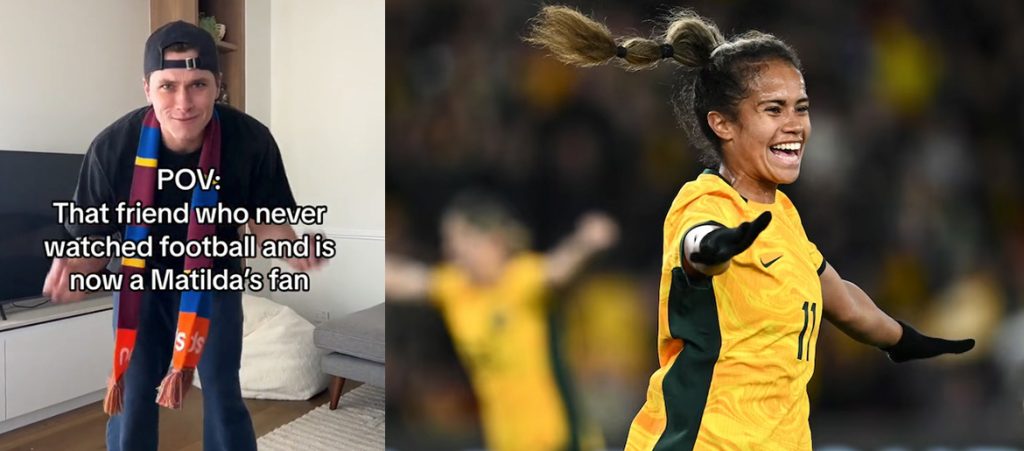
From the moment it began, the FIFA Women’s World Cup has been a masterclass in sports entertainment. From Katie McCabe’s stunning Olimpico goal (the first-ever goal in a World Cup for the Irish women’s team) to Australia’s nail-biting penalty shootout against France, these athletes are putting on a hell of a performance and people are paying attention. Australia’s heartbreaking semi-final loss to England smashed national sports broadcast records. with over 11.5 million Australians tuned in (and that’s before you take into account Optus Sport view and the hundreds of thousands who watched at live sites around the country).
To say it’s an exciting moment for women’s sport – and sport in general – would be a gross understatement. That said, having followed the tournament quite religiously this year, it’s clear that this isn’t the worst thing we could say…
How we talk about women’s sport
Throughout history, one thing has been very clear about women’s sport: we have no idea how to talk about it. The 2023 Women’s World Cup has been no exception. First, there was Channel 7 commentator David Basheer, who remarked that motherhood had not “blunted” the competitive instincts of Matildas player, Katrina Gorry. The comment sparked immediate backlash, with online users pointing out the sexism in his statement. Rightfully so, given that we would never imply that fatherhood and athleticism are incompatible when discussing male athletes.
Then there was the eye-roll-inducing column by Caleb Bond, which attributes the Matildas’ success to the fact that they play like men: “Their skills are exceptional and the play is professional. It is more or less imperceptible from the men’s game.”
Bond argues that the Matildas are the exception to the rule of women’s sport, and that the reason for oft-lower viewership is that women are simply not as good as men. “[People] don’t want to watch second-rate sport. And most of the inferior quality offerings happen to be played by women,” he writes. After all, as Bond so astutely points out, three of Australia’s most celebrated racehorses in the past 20 years have been mares (female horses). That’s not a joke – he really wrote that.
Rhetoric like this simultaneously insists that the country is ‘gender blind’ and will support the highest quality of play regardless, while denigrating virtually all women’s leagues, codes and athletes as ‘worse’.
The one word plaguing women’s sport
While these transgressions vary from tone-deaf to utterly egregious, there is one that stands out from the pack as particularly insidious. One simple word that has come up again and again – I’ve noticed it most often uttered by male spectators, be it strangers or men in my own friend group. A single word, so seemingly innocuous that it’s all too easy to miss it.
Actually.
“They’re actually good.” “They’re actually so fast.” “They’re actually selling out stadiums.”
Although it might appear harmless at first glance, this phrasing is both reductive and problematic. In which circumstance would we express surprise that male professional soccer players are good at their jobs or capable of performing at the highest possible level? Why should we be shocked that female players at the highest level of competition can do the exact same thing?
Of course, not everyone who says “actually” in reference to women in sport means it negatively. Most people mean it as genuine compliment; that they are stunned and incredibly impressed by the athletic prowess of these players. Many of us don’t even realise we’re using the word at all.
While the intent is not to insult, this language is a sign of how we subconsciously perceive female athletes.
It’s particularly dismissive of players who have had to overcome adversity to reach this level of elite sport, including the tournament’s many BIPOC and LGBTQIA+ players. Matildas captain Sam Kerr is a prime example, one of the most accomplished and recognisable soccer players in the world. In a 2021 Forbes feature, Kerr spoke of her Indian heritage and coming up in a sport that has long lacked non-white role models. She said she wanted to help fill that void and encourage young Indian girls to take up the game.
Kerr is also one of the approximately 100 openly LGTBQIA+ players and coaches involved in this year’s tournament. This Women’s World Cup is one of the most openly queer sporting events in history – providing triumphant global visibility to groups that have and continue to be ostracised and persecuted.
By continuously reducing the achievements of marginalised groups, we are not just misspeaking. We’re upholding a broken framework built on systemic oppression; a framework riddled with offences, from racism to pay disparity to toxic masculinity.
Even one word can carry more weight, meaning, and if we’re not careful, more harm than we initially realise. That’s why it’s high time to broaden both our perspectives and our vocabularies. Ditch the ‘actually’. In doing so, we might just create a discourse that is not only more interesting but more impactful.
After all, the athletes of the 2023 FIFAWWC have made unprecedented strides for women’s sport at a global scale. They have entertained and inspired us. They have carved a path forward for the next generation of female athletes. They have shown us that progress is actually possible.
Speaking of them with the respect they so wholly deserve is the least we can do.
Smart people read more:
Why we use women’s professional titles less than men’s – BBC
Could This Be The Turning Point For Professional Women’s Sport?
Misogyny towards women’s sport common among male football fans, study finds – Guardian

Comments are closed.